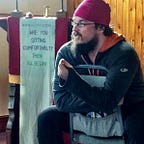50k : lessons learned from ultramarathons
One of the advantages of long runs and walks is that you have a lot of time to yourself with nothing to do but think. It is, in many ways, the ultimate luxury — in a world where seconds are precious — to have hours to ponder.
So aside from the satisfaction of setting a not inconsiderable PR of 7 hours 49 (the 37 on the stats above ignores the 12 minutes I stopped at half way for food, water and loo) I was able to collect some thoughts along the way. The most useful of those was realising that a run like this can usefully be divided into 5 equal parts of 10k each (I’m sure it works for other distances too).
The 1st 10k — this is for finding out what kind of a day you’re having. Be really mindful. Notice your body & how it’s responding to the conditions, to the effort, to the surroundings. Figure out what that might mean, how it affects your goals. Don’t necessarily adjust at this point, but notice. How heavy are your legs? How much pressure is there in your joints? Do you feel the seams of your clothing more than usual? And do these feelings ease as the 10k goes on, do they grow, or do they just stay there?
The 2nd 10k — this is for sorting out your technical stuff. Keep on top of nutrition & hydration & kit. And now you know what the trajectory is, make any adjustments that might be needed as a result of things identified in the 1st 10k.
The 3rd 10k — these are the tough, boring, crucial kilometres. There’s a saying (an old one but I first heard it from the fabulous Billy Yang) “don’t be an idiot in the first half, don’t be a coward in the second.” I’ve kind of adapted that to Benaud’s Law from cricket (in a 50 over match, your par score to aim for is twice what you have after 30 overs). The result is that my first half of a 50k run ends after 30k. Not in terms of time, but in terms of when you stop being super conservative. (It’s interesting that this actually corresponds to about Forest Hills point in the Western States 100, which, at mile 62, is where the racing really begins). This is about not throwing it away by pushing too hard too soon, about not ignoring a hot spot, not deciding you can save a minute here by not changing socks or a minute there by skipping food.
4th 10k — working out what’s left in the tank now you’ve got this far. Starting to test it out. Allowing yourself, at last, to do some maths!
5th 10k — holding on and leaving absolutely nothing on the course!
This was the culmination of a set of 3 training blocks going back over a year. They mark the end of my “foundation-building” phase. I am now in a place physically where I can start to work on honing specific skills. But I will take some valuable lessons from this year:
- consistency is everything. Keep training at a level where you don’t get injured and you’ll progress less than you might like week to week but way more season to season.
- train in blocks and rotate the focus of each block to give your body rest and stimulation at the same time.
- there are knock-on benefits to being physically healthy in terms of alertness and mental performance. But only if you rest. Rest. Rest.
- don’t follow someone else’s plan. Especially if you’re neurodivergent. Find the plan you can do and modify it. If you find inspirational people to guide and motivate you, look to them for technical advice, and for principles to follow not for a day to day plan that comes off the peg.
- it works to do lots of things if you’re ADHD rather than focusing on 1. It keeps you interested all the time.
- life gets in the way — and that’s OK. Don’t listen to the many people on social media who shame anyone who fails to put training before relationships, or anyone who says you have to work every day or it doesn’t count. That’s not sustainable for a better life.
- adapt — living during Covid stripped my mind of its ability to do anything for months on end. Furthermore, I lost my access to the gym for over a year. It was only adaptin that has got me through. Not changing my vision — but how I get there.
- commitment is everything — but that doesn’t mean you commit to “the process” in a rigid way — it means you commit to the goal (see the previous point).
